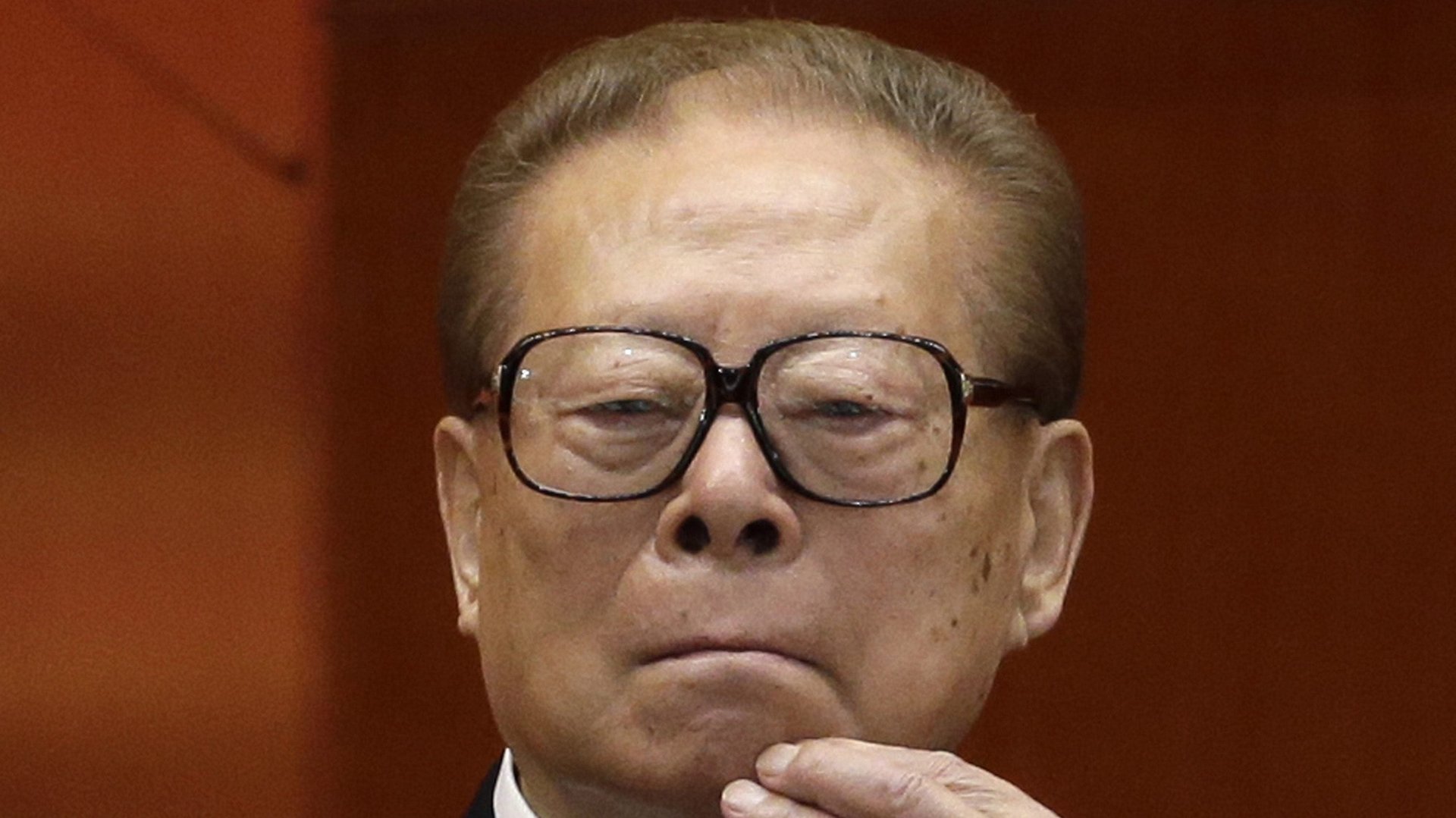China’s toad-like 90-year-old former president has become an unlikely idol for the country’s millennials
China’s former president Jiang Zemin turns 90 years old today (Aug. 17), and he’s already having a grand birthday celebration online.


China’s former president Jiang Zemin turns 90 years old today (Aug. 17), and he’s already having a grand birthday celebration online.

Chinese millennials have taken to social media platforms like WeChat and Weibo to send birthday wishes and pay tribute to the man they’ve nicknamed “the elder.” Some changed their profile photos to a headshot of Jiang with the red number “90” as the backdrop. Others posted ”+1s,” (link in Chinese), which stands for “one more second,” half-jokingly hoping to add a second to his already long life.
These millennials even have a name for themselves: hasi (蛤丝), or “toad fans.” Jiang’s other nickname is “toad”—haha (蛤蛤)—thanks to his thick, square-rimmed glasses, broad mouth, and love of high-waisted pants. In years past, Chinese netizens mocked his appearance, clumsy manners, and rumored affair with a female military singer. More recently, though, this ridicule has turned into worship, a personality cult widely embraced by China’s millennials.
On Aug. 17, just after midnight, a self-described toad fan from southwestern Sichuan province, sent a previously-prepared message on WeChat. “Long live the brightest star in the night sky!” wrote Feng, 22, who asked to be identified only by his surname, on his Moments feed. He posted nine iconic photos of Jiang from the former president’s decade-long tenure. In a WeChat group Feng belongs to, more than a hundred similarly aged toad fans also sent birthday wishes just past midnight.

Chinese millennials admire Jiang for his unscripted public persona, a trait that’s hard to find in other Chinese politicians. Although they might be too young to remember his 14 years in power, they watch and share videos of his overseas visits and speeches to appreciate his confidence, openness, and occasionally his bad manners.
In the videos, Jiang plays Hawaii guitar (aka the ukulele), dances the waltz, sings Elvis Presley’s Love Me Tender, and speaks several foreign languages including Russian, Romanian, and English, albeit with a heavy accent. ”Without a doubt, he was the one with the most artistic temperament among all Chinese leaders,” said Feng.
When Jiang met with Spanish king Juan Carlos in 1996, he pulled out a comb to fix his hair at a reception as if no one was watching. During a 2000 interview with CBS’s Mike Wallace, he broke into a Chinese folk song and recited part of the Gettysburg Address in between their spats over the Tiananmen Square massacre and the Falun Gong. When angered by a Hong Kong journalist later in 2000, he belittled the Hong Kong press, and unwittingly created a meme in English by calling them “Too young, too simple, sometimes naive.”
Jiang has become a rich source of online emoticons, memes, and even real-life conversations. Amos Chen, a 24-year-old graduate student from the southwestern city of Chengdu, said he often uses Jiang’s quotes during daily life. For example, he uses the Jiang line ”please find someone better qualified” when he rejects invitations. In this way, he said, he can tell if someone is also a toad fan. Videos of Jiang, like the one of him scolding the Hong Kong journalist, have gone viral on China’s internet.
While it all sounds like fun and games, there’s more serious political yearning behind it. Jiang’s unscripted goofiness makes him seem much more human than current president Xi Jinping, his young fans say. One 22-year-old college graduate from Beijing, who asked to be called Abner, said these videos have affected his generation, where future Chinese leaders will come from. Regardless of whether those future leaders are currently toad fans, he said, they will likely be closer to the people because of Jiang’s videos.
“I hope there will be more leaders like Jiang,” Abner said, “otherwise the country is too stuffy, or feels a bit like a dictatorship.”
Although the so-called “toad worship culture” is mostly irrelevant to politics right now, online discussions about Jiang are strictly censored in China. Searches of “Jiang Zemin” or “haha” in the Chinese language are now entirely blocked on Weibo (link in Chinese, registration required). The topic is especially sensitive (paywall) because Jiang was historically a political rival of Xi, and his presidency represents a 1990s China that was in some ways more liberal than the nation is today.
Feng, the toad fan from Sichuan, says worshiping Jiang is a way to express his dissatisfaction with Xi’s rule. As the economy slows, Feng believes Xi’s anti-corruption drive is a way to purge his political opponents. But he admits it’s difficult for others to read his dissatisfaction in his birthday wishes for Jiang. “I just need to vent,” he said.